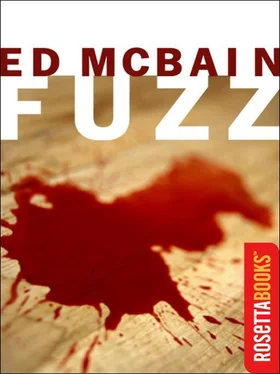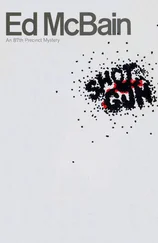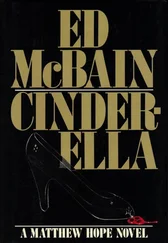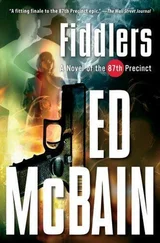Ed Mcbain - Fuzz
Здесь есть возможность читать онлайн «Ed Mcbain - Fuzz» весь текст электронной книги совершенно бесплатно (целиком полную версию без сокращений). В некоторых случаях можно слушать аудио, скачать через торрент в формате fb2 и присутствует краткое содержание. Жанр: Полицейский детектив, на английском языке. Описание произведения, (предисловие) а так же отзывы посетителей доступны на портале библиотеки ЛибКат.
- Название:Fuzz
- Автор:
- Жанр:
- Год:неизвестен
- ISBN:нет данных
- Рейтинг книги:3 / 5. Голосов: 1
-
Избранное:Добавить в избранное
- Отзывы:
-
Ваша оценка:
- 60
- 1
- 2
- 3
- 4
- 5
Fuzz: краткое содержание, описание и аннотация
Предлагаем к чтению аннотацию, описание, краткое содержание или предисловие (зависит от того, что написал сам автор книги «Fuzz»). Если вы не нашли необходимую информацию о книге — напишите в комментариях, мы постараемся отыскать её.
Fuzz — читать онлайн бесплатно полную книгу (весь текст) целиком
Ниже представлен текст книги, разбитый по страницам. Система сохранения места последней прочитанной страницы, позволяет с удобством читать онлайн бесплатно книгу «Fuzz», без необходимости каждый раз заново искать на чём Вы остановились. Поставьте закладку, и сможете в любой момент перейти на страницу, на которой закончили чтение.
Интервал:
Закладка:
“You want five grand left on a park bench?” Kling asked.
“You’ve got it,” the man said, and hung up.
“You think that’s all of it?” Kling asked Hawes.
“I don’t know,” Hawes said. He looked up at the wall clock. “Let’s give him till midnight. If we don’t get another call by then, we’ll ring Pete.”
“Okay,” Kling said.
He began typing again. He typed hunched over the machine, using a six-finger system that was uniquely his own, typing rapidly and with a great many mistakes, overscoring or erasing as the whim struck him, detesting the paperwork that went into police work, wondering why anyone would want a metal pail left on a park bench where any passing stranger might pick it up, cursing the decrepit machine provided by the city, and then wondering how anyone could have the unmitigated gall to demand five thousand dollars not to commit a murder. He frowned as he worked, and because he was the youngest detective on the squad, with a face comparatively unravaged by the pressures of his chosen profession, the only wrinkle in evidence was the one caused by the frown, a deep cutting ridge across his smooth forehead. He was a blond man, six feet tall, with hazel eyes and an open countenance. He wore a yellow sleeveless pullover, and his brown sports jacket was draped over the back of his chair. The Colt .38 Detective’s Special he usually wore clipped to his belt was in its holster in the top drawer of his desk.
He took seven calls in the next half-hour, but none of them were from the man who had threatened to kill Cowper. He was finishing his report, a routine listing of the persons interrogated in a mugging on Ainsley Avenue, when the telephone rang again. He reached for the receiver automatically. Automatically, Hawes lifted the extension.
“Last call tonight,” the man said. “I want the money before noon tomorrow. There are more than one of us, so don’t attempt to arrest the man who picks it up or the commissioner will be killed. If the lunch pail is empty, or if it contains paper scraps or phony bills or marked bills, or if for any reason or by any circumstance the money is not on that bench before noon tomorrow, the plan to kill the commissioner will go into effect. If you have any questions, ask them now.”
“You don’t really expect us to hand you five thousand dollars on a silver platter, do you?”
“No, in a lunch pail,” the man said, and again Kling had the impression he was smiling.
“I’ll have to discuss this with the lieutenant,” Kling said.
“Yes, and he’ll doubtless have to discuss it with the parks commissioner,” the man said.
“Is there any way we can reach you?” Kling asked, taking a wild gamble, thinking the man might hastily and automatically reveal his home number or his address.
“You’ll have to speak louder,” the man said. “I’m a little hard of hearing.”
“I said is there any way …”
And the man hung up.
The bitch city can intimidate you sometimes by her size alone, but when she works in tandem with the weather she can make you wish you were dead. Cotton Hawes wished he was dead on that Tuesday, March 5. The temperature as recorded at the Grover Park Lake at seven A.M. that morning was twelve degrees above zero, and by nine A.M. — when he started onto the Clinton Street footpath — it had risen only two degrees to stand at a frigid fourteen above. A strong harsh wind was blowing off the River Harb to the north, racing untrammeled through the narrow north-south corridor leading directly to the path. His red hair whipped fitfully about his hatless head, the tails of his overcoat were flat against the backs of his legs. He was wearing gloves and carrying a black lunch pail in his left hand. The third button of his overcoat, waist high, was open, and the butt of his Magnum rested just behind the gaping flap, ready for a quick right-handed, spring-assisted draw.
The lunch pail was empty.
They had awakened Lieutenant Byrnes at five minutes to twelve the night before, and advised him of their subsequent conversations with the man they now referred to as The Screwball. The lieutenant had mumbled a series of grunts into the telephone and then said, “I’ll be right down,” and then asked what time it was. They told him it was almost midnight. He grunted again, and hung up. When he got to the squadroom, they filled him in more completely, and it was decided to call the parks commissioner to apprise him of the threat against his life, and to discuss any possible action with him. The parks commissioner looked at his bedside clock the moment the phone rang and immediately informed Lieutenant Byrnes that it was half past midnight, wasn’t this something that could wait until morning?
Byrnes cleared his throat and said, “Well, someone says he’s going to shoot you.”
The parks commissioner cleared his throat and said, “Well, why didn’t you say so?”
The situation was ridiculous.
The parks commissioner had never heard of a more ridiculous situation, why this man had to be an absolute maniac to assume anyone would pay him five thousand dollars on the strength of a few phone calls. Byrnes agreed that the situation was ridiculous, but that nonetheless a great many crimes in this city were committed daily by misguided or unprincipled people, some of whom were doubtless screwballs, but sanity was not a prerequisite for the successful perpetration of a criminal act.
The situation was unthinkable.
The parks commissioner had never heard of a more unthinkable situation, he couldn’t even understand why they were bothering him with what were obviously the rantings of some kind of lunatic. Why didn’t they simply forget the entire matter?
“Well,” Byrnes said, “I hate to behave like a television cop, sir, I would really rather forget the entire thing, as you suggest, but the possibility exists that there is a plan to murder you, and in all good conscience I cannot ignore that possibility, not without discussing it first with you.”
“Well, you’ve discussed it with me,” the parks commissioner said, “and I say forget it.”
“Sir,” Byrnes said, “we would like to try to apprehend the man who picks up the lunch pail, and we would also like to supply you with police protection tomorrow night. Had you planned on leaving the house tomorrow night?”
The parks commissioner said that Byrnes could do whatever he thought fit in the matter of apprehending the man who picked up the lunch pail, but that he did indeed plan on going out tomorrow night, was in fact invited by the mayor to attend a performance of Beethoven’s Eroica given by the Philharmonic at the city’s recently opened music and theater complex near Remington Circle, and he did not want or need police protection.
Byrnes said, “Well, sir, let’s see what results we have with the lunch pail, we’ll get back to you.”
“Yes, get back to me,” the parks commissioner said, “but not in the middle of the night again, okay?” and hung up.
At five A.M. on Tuesday morning while it was still dark, Detectives Hal Willis and Arthur Brown drank two fortifying cups of coffee in the silence of the squadroom, donned foul-weather gear requisitioned from an Emergency Squad truck, clipped on their holsters, and went out onto the arctic tundra to begin a lonely surveillance of the third bench on the Clinton Street footpath into Grover Park. Since most of the park’s paths meandered from north to south and naturally had entrances on either end, they thought at first there might be some confusion concerning the Clinton Street footpath. But a look at the map on the precinct wall showed that there was only one entrance to this particular path, which began on Grover Avenue, adjacent to the park, and then wound through the park to end at the band shell near the lake. Willis and Brown planted themselves on a shelf of rock overlooking the suspect third bench, shielded from the path by a stand of naked elms. It was very cold. They did not expect action, of course, until Hawes dropped the lunch pail where specified, but they could hardly take up posts after the event, and so it had been Byrnes’ brilliant idea to send them out before anyone watching the bench might observe them. They did windmill exercises with their arms, they stamped their feet, they continuously pressed the palms of their hands against portions of their faces that seemed to be going, the telltale whiteness of frostbite appearing suddenly and frighteningly in the bleak early morning hours. Neither of the two men had ever been so cold in his life.
Читать дальшеИнтервал:
Закладка:
Похожие книги на «Fuzz»
Представляем Вашему вниманию похожие книги на «Fuzz» списком для выбора. Мы отобрали схожую по названию и смыслу литературу в надежде предоставить читателям больше вариантов отыскать новые, интересные, ещё непрочитанные произведения.
Обсуждение, отзывы о книге «Fuzz» и просто собственные мнения читателей. Оставьте ваши комментарии, напишите, что Вы думаете о произведении, его смысле или главных героях. Укажите что конкретно понравилось, а что нет, и почему Вы так считаете.












